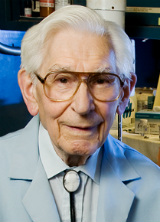What You Eat Can Prevent Heart Disease

Fred A. Kummerow, Ph.D.
There are several dietary elements that are essential to the making of cells in our bodies and thus to keeping us alive. These include:
1. Eating enough of the right kinds of proteins. Proteins are made up of amino acids; there are ten that are called essential since your body cannot make them on its own.
All ten appear in animal products, like eggs, milk, and meat, and, of course, in human milk. All vegetable proteins are short in one or more of these amino acids and thus a diet based on vegetable proteins must have a variety to balance each other out.
For example, corn and beans work together as do beans and rice in providing all of the amino acids. Amino acids contain nitrogen, oxygen and hydrogen. Sufficient amounts of the right kinds of protein keep the body in a positive balance of these.
2. Eating enough fat - yes, I said fat. There are two essential fatty acids (omega6 and omega3) needed to keep the blood flowing. Both are available in animal products, fish, shrimp, as well as vegetable oils in smaller concentrations.
3. Eating a variety of foods to provide vitamins, minerals and trace minerals. These include fruits, vegetables, nuts, seeds, eggs, meat, fish, etc.
4. Eating enough carbohydrates to provide energy for your daily tasks, but not so many as to cause you to gain weight. These are in bread, pasta, beans, potatoes, and foods containing sugar.
There are several problems with the American diet, and these work to create various diseases, including heart disease.
5. Americans have been advised to replace saturated fat (from animal sources) with polyunsaturated fat (from vegetable sources). Currently the ratio is six times more than in 1910. When that much polyunsaturated fat is eaten, it gets turned into oxidized fat by the liver.
That oxidized fat changes the composition of arteries, making them more susceptible to plaque build-up. Cutting down on polyunsaturated fat and eating more anti-oxidants (vegetables and fruits with colored skin) would lead to a healthier diet.
6. Eliminating all forms of artificial trans fats. (Naturally occurring trans fats in products like butter are fine since they are handled naturally by the body.)
Artificial trans fats cannot be utilized by the body except for energy sources. They cannot help build cells. In fact, they inhibit the formation of prostacyclin in the body which is needed to keep blood flowing.
Prostacyclin is constantly made by the body; it cannot be stored. This inhibition might even lead to sudden heart attacks since the heart requires a steady flow of blood.
This is an easy one to eliminate if you just read food labels. There should be zero (0) grams of trans fat listed (and this is important) the ingredients should not include hydrogenated oil of any kind. This is because foods may be listed as zero trans fat if there is less than .5 grams/serving.
7. Eat no fried foods. This is because the process of frying changes the composition of some aspects of the food. It then gets into the blood stream and changes the composition of the arteries. This change leads to the build-up of plaque; it continues to build until there is no more blood flow.
Again, this could be an easy one to eliminate unless you love eating potato chips, fried chicken or anything fried! However, many people want some variety in their foods, so if you insist on eating something fried, make sure it is fried in fresh oil and eaten immediately after the frying.
So what is a nutritious diet? Here's what I have eaten for over sixty years:
Breakfast: An egg (cooked in butter), cooked whole wheat grains and oatmeal served with several kinds of fruit, including a banana and those with a colored skin, and topped with milk, a few walnuts, pecans or almonds, yogurt, and milk.
Lunch: Meat or fish prepared under the broiler. A small piece of baked potato. Some fresh or frozen vegetables. Lettuce salad with olive oil and vinegar dressing. Fruit. Milk.
Dinner: Smaller portions of what I ate for lunch. Meat, vegetables and fruit, milk.
And of course, I exercise daily too.
I hope my personal experiences on diet make sense to you. How our bodies work is a miracle and we can help keep them healthy by treating them as such. Food can be a source of pleasure as well as a source of health.
Fred A. Kummerow, Ph.D.
Updated June 2016






